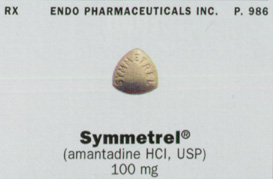
SYMMETREL
General description
Symmetrel is the version of amantadine produced by Endo
Pharmaceuticals. It is available in tablet and syrup form, both of which
are taken orally. Amantadine acts as both an anti-Parkinson's and an
antiviral drug, specifically for fighting against Influenza A, or the flu.
Mechanism
The primary mechanism of action is not clearly understood
though it appears that amantadine will prevent release of
infectious viral nucleic acids into the host cell and in some
cases will prevent viral assembly.
Indications
Symmetrel is used for both prophylaxis and treatment of signs
and symptoms of Influenza A infection. It is not a
strain-specific drug. If early vaccination is not feasible, is
contraindicated, or is unavailable, Symmetrel can serve as a
chemoprophylaxis agent. It is also indicated for use in
uncomplicated infections of the respiratory tract caused by
Influenza A. It is not known to be effective against any strain but
Influenza A strains.
Usage/Dosage
For adults, the recommended dosage is 200 mg once a day for both
prophylaxis and treatment. If the patient complains of CNS effects, then
splitting the dosage up through the course of the day can sometimes
relieve symptoms. For patients 1-9 yrs of age, a daily dose should be
calculated based on a 2 to 4 mg/lb/day scale. The total dosage should not
exceed 150 mg. For patients 9-12 yrs of age, a dose of 200 mg per day can
be administered as two 100 mg doses daily. Symmetrel adminstration should
begin in anticipation of flu season and be continued at least 10 days
after known exposure to Influenza A. As a treatment, adminstration should
begin as soon after exposure as possible.
Precautions
Symmetrel overdose has been reported to cause death with a
lethal dose as low as 2 grams. Symmetrel does not completely
prevent host immune response to influenza A infection, and
patients may develop immune response to natural disease or vaccination at
a later date.
Contraindications
Symmetrel is contraindicated for patients with known
sensitivity to amantadine chloride or any other ingredients of
Symmetrel. Patients with history of CNS disorder, such as
epilepsy or psychiatric illness should be observed carefully
while under treatment with Symmetrel as well as patients with a
history of congestive heart failure. No causal links have been proven, but
Symmetrel could potentially be an agent in promoting epilepsy, heart
failure, or even suicide attempts. Patients with untreated angle closure
glaucoma should not receive Symmetrel.
Potential Adverse Effects
Aside from the potential dangers listed under
contraindications, Symmetrel has most commonly been reported to cause
nausea, dizziness, and light-headedness. It may be a cause of
trembling when adminstered with thoridazine.